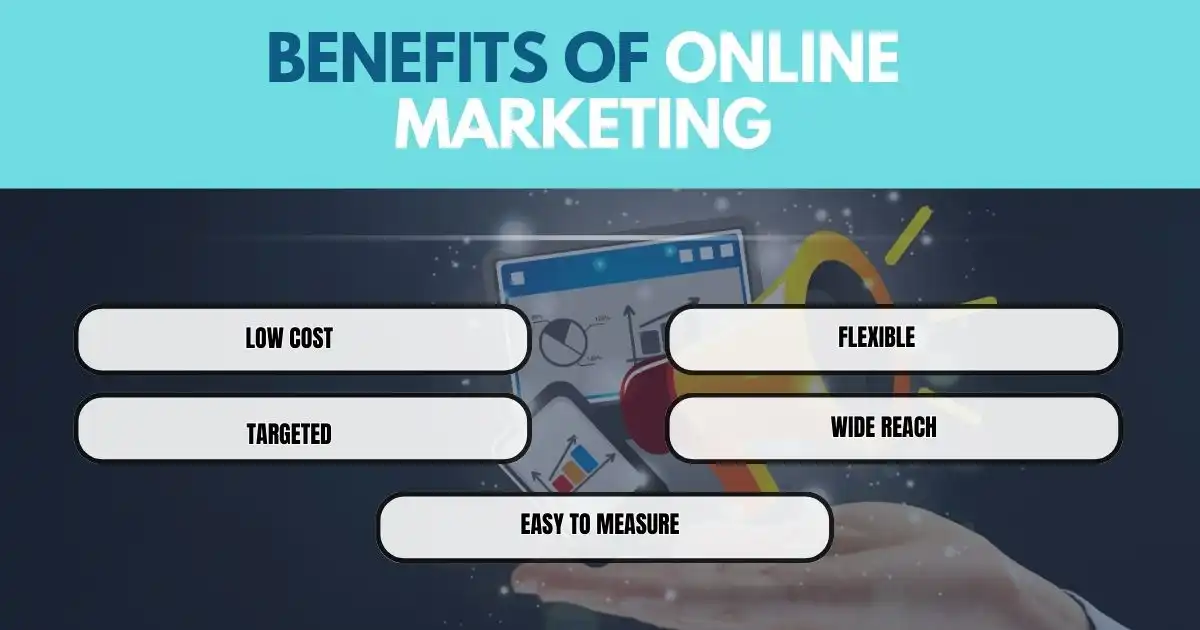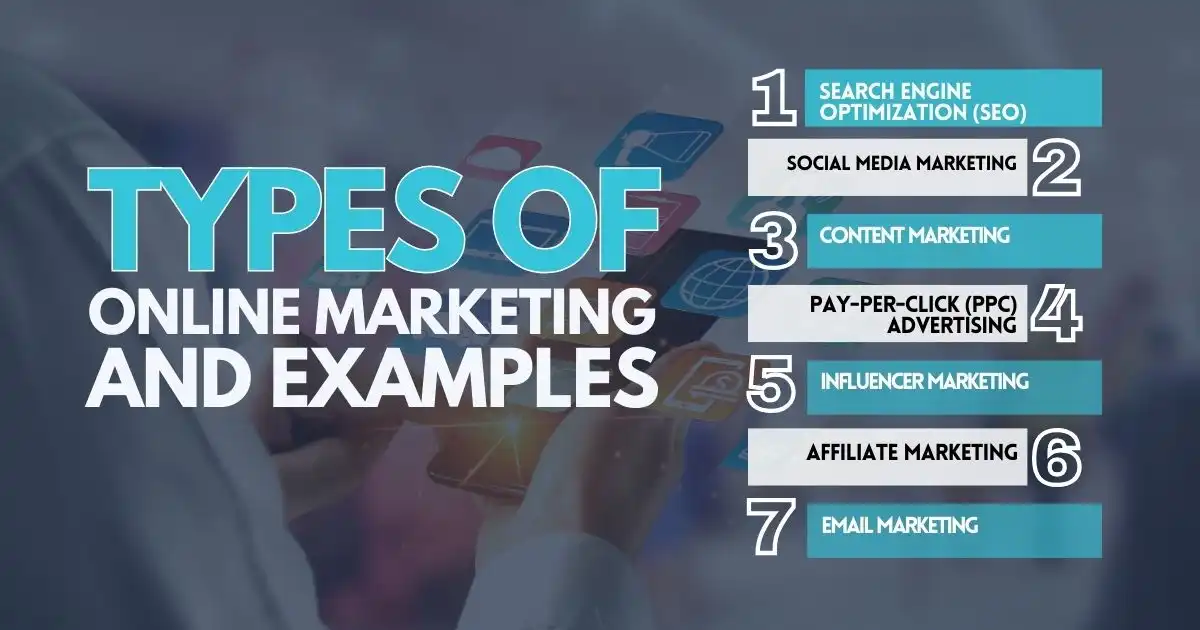The global digital marketing market was valued at USD 780 billion in 2023 and is projected to grow at a CAGR of approximately 11.1% from 2024 to 2030. Online marketing is more than just ads; it focuses on making your brand visible, engaging with customers, and growing your business.
Having a good product or service isn’t enough—businesses need to be seen online to reach the right customers. That’s where online marketing comes in.
Online marketing helps promote your brand, connect with people, build relationships that drive sales, and reach those actively looking for what you offer, no matter where they are.
Benefits of Online Marketing
Online marketing offers many important advantages for businesses, making it a valuable tool.

Low Cost
Online marketing is often much more affordable than traditional methods like TV, radio, or print ads. For example, a 30-second TV commercial can cost anywhere from $5,000 to $30,000 per spot, not including production costs. Radio ads can range from $200 to $5,000 per week, depending on the station and market size. In contrast, online marketing allows you to share content on social media, blogs, or websites at little to no cost.
Additionally, online ads on platforms like Facebook or Google can cost as little as $5 per day, offering flexibility for any budget.
Over a year, businesses can save thousands of dollars by focusing on digital strategies instead of traditional advertising. Tools like Google Analytics also provide free insights into campaign performance, helping you optimize efforts without extra expenses.
Targeted
One of the biggest benefits of online marketing is the ability to target specific audiences. You can focus on people based on their age, gender, location, interests, and behaviors. For example, you can show ads to people who have already visited your website or are interested in similar products.
This makes your marketing efforts more effective and helps you connect with people who are more likely to become customers. You can also break your audience into smaller groups and create custom messages for each group, improving the chance of getting them to act, if it’s buying a product or signing up for a newsletter.
Flexible
Online marketing allows you to adjust your plans efficiently. If you want to change your budget, switch platforms, or try new ideas, online marketing offers the flexibility to make changes as needed.
You can experiment with different strategies, A/B test ads or content, and optimize your campaigns to improve results. If something isn’t working well, you can change it right away, saving time and resources.
Wide Reach
With online marketing, you can reach a large, global audience. If you’re a small local business or a company that wants to grow internationally, online marketing can help you reach people from all over the world.
Social media platforms like Facebook, Instagram, and X (formerly Twitter), along with email marketing and search engines like Google, provide effective tools to amplify your message and attract new customers. With over 3 billion monthly active users on Facebook and 2 billion on Instagram, these platforms offer extensive reach.
These channels allow small businesses to connect with a wide audience and compete with larger companies, all while working within minimal resources.
Easy to Measure
Online marketing offers the advantage of real-time performance tracking through tools like Google Analytics and Hotjar. These platforms provide insights into website traffic, user behavior, and conversion rates.
For instance, Google Analytics shows visitor numbers, popular pages, and conversion percentages, while Hotjar adds heatmaps and session recordings for deeper user insights. This data helps businesses refine strategies and improve marketing effectiveness.
If you want to assess the success of an email campaign or track views on social media ads, online marketing equips you with the tools to measure performance and improve results over time.
Types of Online Marketing and Examples
There are many types of online marketing, each helping businesses reach customers in different ways. Here are some of the most common types of online marketing and examples of how businesses use them:

Search Engine Optimization (SEO)
SEO helps businesses get found on search engines like Google. By improving their website’s content, structure, and user experience, businesses can rank higher in search results.
For example, a business could use SEO to appear at the top of the search results for keywords like “interior design ideas.” The better the SEO, the more people can find the business, which can lead to more customers.
Social Media Marketing
Social media platforms like Facebook, Instagram, and Twitter are great tools for businesses to connect with customers.
For example, Starbucks uses social media to promote campaigns like the #RedCupContest on Instagram, where people share photos of their holiday cups. This helps increase brand awareness and engage with customers in a fun way.
Content Marketing
Content marketing involves creating helpful or interesting content to attract and keep customers. This can include blog posts, videos, or podcasts.
For example, BuzzFeed uses email marketing to send out content recommendations to different groups of people, encouraging them to visit their website.
Pay-Per-Click (PPC) Advertising
PPC ads let businesses pay for ads that appear on search engines, websites, or social media platforms. For example, HomeToGo uses PPC to target people searching for accommodation options in different locations. When people search for “rent house in Las Vegas,” they might see an ad for HomeToGo, driving more visitors to their site.
Influencer Marketing
Influencer marketing is when businesses work with social media influencers to promote their products.
Glossier, a beauty brand, partners with influencers to help promote its products on Instagram. Since influencers already have a large, trusted following, their recommendations can help businesses reach new customers.
Affiliate Marketing
Affiliate marketing involves businesses paying people or companies (called affiliates) a commission for promoting their products.
For example, Amazon has an affiliate program where website owners and bloggers can earn money by referring customers to Amazon’s website. Affiliates promote Amazon products and get paid a commission for each sale made through their link.
Email Marketing
Email marketing is about sending emails to customers to share updates, promotions, or useful content.
For example, Semrush sends email newsletters with helpful marketing tips, keeping subscribers informed and engaged. By personalizing the emails based on interests, businesses can build stronger relationships with their audience.
Why Online Marketing Is Important for Your Business
Online marketing is more than just ads—it’s a way to get your business noticed, build relationships with customers, and grow. It’s like planting seeds that will turn into loyal customers over time. The best part?
You can reach people from all over without spending a lot of money. With the right online strategies, you can adjust your plan effectively and see results fast. It’s not about waiting for success to find you, it’s about taking action to make it happen.
So, why not start today? Use online marketing to get your brand in front of the right people and take your business to the next level. There’s plenty of opportunity out there for you to grab!
FAQs
How to do marketing online?
To do marketing online, start by identifying your target audience and choosing the right platforms, like social media, email, and search engines. Use strategies such as SEO, PPC, and content marketing to attract and engage customers.
What is effective online marketing?
Effective online marketing involves using targeted strategies, such as SEO, social media, and email campaigns, to reach the right audience. Consistently measure results and adjust tactics to improve engagement and conversion rates.
What are the best internet marketing strategies?
The best internet marketing strategies include SEO to improve search rankings, PPC to drive targeted traffic, social media marketing for engagement, and content marketing to build trust and authority.
What is the difference between digital marketing vs online marketing?
Digital marketing covers all marketing efforts using electronic devices, including online and offline channels. Online marketing specifically refers to marketing done over the internet, such as through websites and social media.
